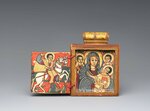

Pentecost is the last day of the Easter season in the Christian liturgical calendar and celebrates the Holy Spirit’s outpouring. The event that transformed a small Jewish sect, Christianity, into a global multicultural movement.
The empowerment of the Christian community contained a linguistic phenomenon (speaking in tongues), which reflected the multicultural nature of the early Christian Church. The Christian faith was birthed in a region of North-Eastern Africa, which saw significant international traffic from Roman provinces located on the African continent, such as Egypt, Africa, Cyrenaica, and Mauretania. We know that the growth of Christianity southward followed the trade routes into the above Roman African provinces and beyond to Ethiopia, Eritrea, and parts of India.
When the late Rev. Dr. Robert E. Hood, the African American Episcopal clergyman and director of the Center for African American Studies at Adelphi University, Long Island, N.Y. USA, posed the question, ‘Must God Remain Greek?’ he was seeking to shed light on the African presence in the Bible and correct the false notion that the Christian Faith was exclusively attached to Western European cultural historiography.
Such a notion has distorted our understanding of the history of the early Christian Church and particularly Africa’s role in its development. The importance of facts such as Egypt was the second wealthiest Roman province after Italy due to its position as the grain basket of the Roman Empire or that during the life and times of Jesus Christ and the early apostles, Alexandria, the capital of Egypt, was the empire’s largest port.
This is why several scholars have taken issue with the dominance of Eurocentric Christian scholarship and its close association with Western European political expansionism and propaganda. An example of how this academic fallacy has corrupted our thinking is the connection of the Roman Empire as synonymous with Europe and, therefore, so-called whiteness.
This bias, therefore, masks relevant information that would reveal the extent of African agency in Christianity and encourages the idea that Christianity is a ‘white man’s religion. So, very little is known of the adoption of Christianity as the official religion of Ethiopia and Eritrea in the 4th century AD or the Nubian Christian kingdoms of Nobadia, Makuria, and Alodia in the 6th century. Prominent in contemporary history books and popular Christian literature is the recognition of Christianity as the official religion of the Roman Empire in 380 AD.
Even when notable African Christians such as Tertullian, Perpetua, Felicity, Clement and Origen of Alexandria, Cyprian, Athanasius, and Augustine are mentioned, they are spoken of as ‘Latin Church Fathers’ and as part of the ‘Hellenized’ civilizations, thereby academically isolating them from their African nexus.
As we celebrate Pentecost, let us rediscover African connectedness to the Early Christian Faith. While you are at it, check out the origins and sources of the modern Pentecostal movement, which is distinctively African and African American.
References:
Robert E. Hood, Must God Remain Greek: Afro-Cultures and God-Talk. Augsburg Fortress Publishers Minnesota 1990
Thomas C. Oden, The African Memory of Mark: Reassessing Early Church Tradition IVP: Illinois 2011.
Walter Arthur McCray, The Black Presence in the Bible: Discovering the Black and African Identity of Biblical Persons and Nations Black Light Fellowship Chicago1995
Comments
No comments on this item Please log in to comment by clicking here